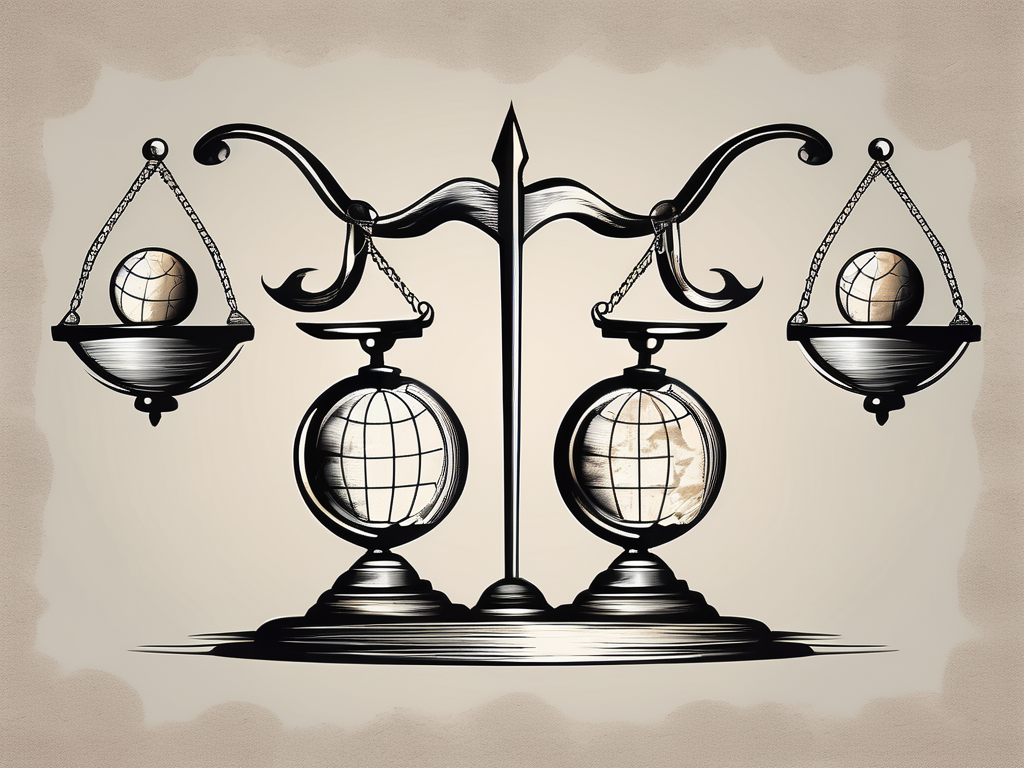In this article, we will delve into the fascinating topic of free will from the perspective of the Baha’i Faith. The Baha’i Faith is a relatively new religion that originated in the 19th century and is founded on the belief in the unity of all religions, the equality of men and women, and the importance of social justice. Understanding how the Baha’i Faith perceives the concept of free will can provide valuable insights into its teachings and principles.
Exploring the Baha’i Faith: An Overview
Before we dive into the Baha’i perspective on free will, let’s first take a brief look at the overall teachings and history of the Baha’i Faith. The Baha’i Faith was founded by Baha’u’llah in 19th-century Persia. Baha’u’llah claimed to be the latest in a line of Messengers from God, including Abraham, Moses, Buddha, Jesus, Muhammad, and others. The Baha’i Faith has since grown into a global religion, with followers from diverse backgrounds and cultures.
Key principles of the Baha’i Faith include the unity of humanity, the elimination of prejudice of all kinds, the independent investigation of truth, and the establishment of a just and peaceful world order. These principles provide a contextual background for understanding the Baha’i beliefs on free will.
The Origin and History of Baha’i
Before we can fully grasp the Baha’i beliefs on free will, it’s important to understand the origin and history of the Baha’i Faith. Baha’u’llah, whose name translates to “The Glory of God,” claimed to be the latest Manifestation of God, tasked with bringing unity and peace to the world. He faced severe persecution and exile, but his teachings gained traction and eventually spread across the globe.
The Baha’i Faith teaches that human beings have the capacity for spiritual growth and development and that the purpose of life is to develop spiritual qualities and contribute to the betterment of society. Free will plays a crucial role in this spiritual journey, enabling individuals to make choices that align with their spiritual values.
Throughout history, Baha’is have faced numerous challenges and obstacles in their pursuit of unity and justice. From the early days of the Faith, Baha’is have been subjected to persecution and discrimination. Despite these hardships, Baha’is have remained steadfast in their commitment to the principles of their Faith, advocating for peace, equality, and the eradication of prejudice.
Key Principles and Teachings of Baha’i
One of the core principles of the Baha’i Faith is the belief in the free will of individuals. Baha’is believe that every human being has the freedom to choose their thoughts, actions, and attitudes. This freedom of choice is seen as a fundamental aspect of human nature and is meant to be exercised responsibly.
In accordance with the Baha’i teachings, individuals are encouraged to make conscious choices that align with spiritual principles. They are called to strive towards virtues such as love, compassion, justice, honesty, and humility. The exercise of free will allows individuals to cultivate these virtues and contribute positively to their own growth and the betterment of society.
Within the Baha’i community, there is a strong emphasis on the concept of consultation. Baha’is believe in the power of collective decision-making, where individuals come together to discuss and explore various perspectives before reaching a consensus. This practice reflects the belief in the inherent worth and value of every individual and the importance of unity in decision-making processes.
This emphasis on individual responsibility and free will is a key aspect of the Baha’i approach to ethics and morality. Baha’is are encouraged to constantly examine their thoughts, words, and actions, and to make choices that are in line with their spiritual values. By doing so, they believe that they can contribute to the creation of a more just and harmonious world.
The Concept of Free Will in Different Religions
To better understand the Baha’i perspective on free will, it can be helpful to examine how the concept is viewed in other major religions. Let’s take a look at Christianity, Islam, and Buddhism.
Free Will in Christianity
In Christianity, free will is often understood as the ability to make choices that are not predetermined by God. It is believed that God has given humans the freedom to choose between good and evil, with the ultimate goal of aligning their will with God’s will. Christian teachings emphasize the importance of making choices that are in line with God’s commandments and teachings.
Within Christianity, the concept of free will has been a topic of theological debate for centuries. Some theologians argue that free will is essential for moral responsibility, as it allows individuals to be accountable for their actions. Others believe that free will is limited by God’s sovereignty and that God’s foreknowledge of human choices does not negate their freedom.
Throughout history, various Christian denominations have developed different interpretations of free will. For example, Calvinism emphasizes the idea of predestination, suggesting that God has already determined who will be saved and who will not. On the other hand, Arminianism emphasizes the importance of human choice and the possibility of resisting God’s grace.
Free Will in Islam
Islam also recognizes the concept of free will. Muslims believe that humans have the freedom to choose between right and wrong and are accountable for their actions. However, it is believed that God’s knowledge encompasses all choices that individuals will make, past, present, and future. Islam puts emphasis on making choices that are in accordance with the teachings of the Quran and the example set by the Prophet Muhammad.
Within Islamic theology, the concept of free will is intricately connected to the idea of divine predestination, or qadar. Muslims believe that while God has knowledge of all things, including human choices, individuals still possess the ability to make independent decisions. It is believed that God’s knowledge of these choices does not infringe upon human free will.
In Islamic philosophy, the concept of free will is often explored in relation to the idea of moral responsibility. Muslims are encouraged to exercise their free will in making choices that align with the principles and values outlined in the Quran. It is believed that individuals will be held accountable for their choices on the Day of Judgment.
Free Will in Buddhism
Buddhism takes a slightly different approach to the concept of free will. While it recognizes that individuals have the ability to make choices, it also acknowledges that these choices are influenced by various factors, including one’s upbringing, conditioning, and surroundings. Buddhism emphasizes the idea of interdependence and the understanding that our actions have consequences, both for ourselves and for others.
In Buddhism, the concept of free will is closely tied to the notion of karma. Karma refers to the law of cause and effect, suggesting that our actions shape our future experiences. While individuals have the freedom to make choices, these choices are believed to be influenced by past actions and the conditions in which one finds oneself.
Buddhism encourages individuals to cultivate mindfulness and awareness in order to make skillful choices that lead to liberation from suffering. The teachings of Buddhism emphasize the importance of understanding the impermanent and interconnected nature of reality, which can help individuals make choices that are beneficial for themselves and others.
Baha’i Perspective on Free Will
Now that we have explored how free will is understood in different religions, let’s delve deeper into the Baha’i perspective. According to the Baha’i teachings, free will is not only a gift but also a responsibility. It is believed that God has endowed human beings with the ability to choose, act, and make decisions that shape their destiny.
However, this freedom is not absolute. The exercise of free will must be balanced with wisdom and guided by spiritual principles. Baha’is believe that individuals are accountable for their choices and actions and will be held responsible for the consequences of their decisions, not only in this world but also in the afterlife.
The Role of Free Will in Human Life According to Baha’i
From a Baha’i perspective, free will is seen as central to the development of the individual and society as a whole. The choices we make have the potential to either contribute to the progress of humanity or hinder its advancement. Baha’is are encouraged to make choices that promote unity, justice, and love, and to refrain from actions that cause harm or create divisions.
Furthermore, Baha’is believe that the exercise of free will is deeply intertwined with the concept of spiritual enlightenment. By making conscious choices that align with spiritual principles, individuals can cultivate virtues, develop their spiritual capacities, and contribute to the betterment of the world.
The Interplay of Free Will and Predestination in Baha’i
An interesting aspect of the Baha’i perspective on free will is the interplay with the concept of predestination. While the Baha’i Faith acknowledges that God has knowledge of all things, including the choices individuals will make, it also emphasizes the importance of personal responsibility and the exercise of free will.
Baha’is believe that God’s knowledge of our choices does not infringe upon our free will. Rather, it serves as a reminder that our choices are not made in isolation but are part of a greater plan. This understanding can provide comfort and guidance, as individuals navigate the complexities of life while striving to align their will with the divine.
The Impact of Free Will on Baha’i Ethics and Morality
Free will has a profound impact on the ethical and moral framework of the Baha’i Faith. Let’s explore how it influences concepts such as personal responsibility and social justice.
Free Will and Personal Responsibility in Baha’i
Baha’i teachings emphasize individual responsibility for one’s choices and actions. It is believed that each individual has the power to shape their own character and spiritual development through the exercise of free will. Personal responsibility extends beyond one’s personal life and encompasses actions that impact others and society at large.
This understanding of personal responsibility encourages Baha’is to be mindful of their choices and strive towards moral and ethical behavior in all aspects of life.
Free Will and Social Justice in Baha’i
Another crucial aspect of the Baha’i teachings is the emphasis on social justice and the elimination of prejudice and inequality. Baha’is believe that the exercise of free will should extend to the pursuit of justice and the promotion of equality for all individuals, regardless of their race, gender, or background.
The principles of the Baha’i Faith call for unity and cooperation among all people, and it is through the exercise of free will that individuals can actively work towards the elimination of social injustices and the establishment of a more equitable world.
Controversies and Misunderstandings about Free Will in Baha’i
As with any complex philosophical concept, there are controversies and misunderstandings surrounding the Baha’i beliefs on free will. Let’s address some common misconceptions and criticisms.
Common Misconceptions about Free Will in Baha’i
One common misconception about the Baha’i view of free will is that it advocates for absolute freedom without any limitations or consequences. However, the Baha’i teachings emphasize the importance of making choices that align with spiritual principles and have positive effects on individuals and society.
Another misconception is that the Baha’i Faith believes in predestination and denies the existence of free will. As previously discussed, while the Baha’i Faith acknowledges God’s knowledge of all things, it affirms the importance of personal responsibility and the exercise of free will in shaping one’s destiny.
Addressing the Criticisms of Baha’i View on Free Will
Some critics argue that the concept of free will is incompatible with the Baha’i belief in the oneness of God and the guidance of divine Messengers. However, Baha’is believe that free will is a necessary component of spiritual growth and development, as it allows individuals to make choices that align with their understanding of God’s teachings.
The Baha’i teachings emphasize the harmony between free will and the guidance provided by a Manifestation of God, seeing them as complementary rather than contradictory.
In conclusion, the Baha’i belief in free will is deeply rooted in their understanding of the human capacity for spiritual growth and development. Free will is seen as a gift and responsibility, enabling individuals to make choices that align with their spiritual values and contribute to the betterment of society. While Baha’is acknowledge the knowledge of God in all things, including human choices, they emphasize personal responsibility and the importance of the exercise of free will. This understanding of free will has a profound impact on how Baha’is approach ethics, personal responsibility, social justice, and the pursuit of unity among all people.












